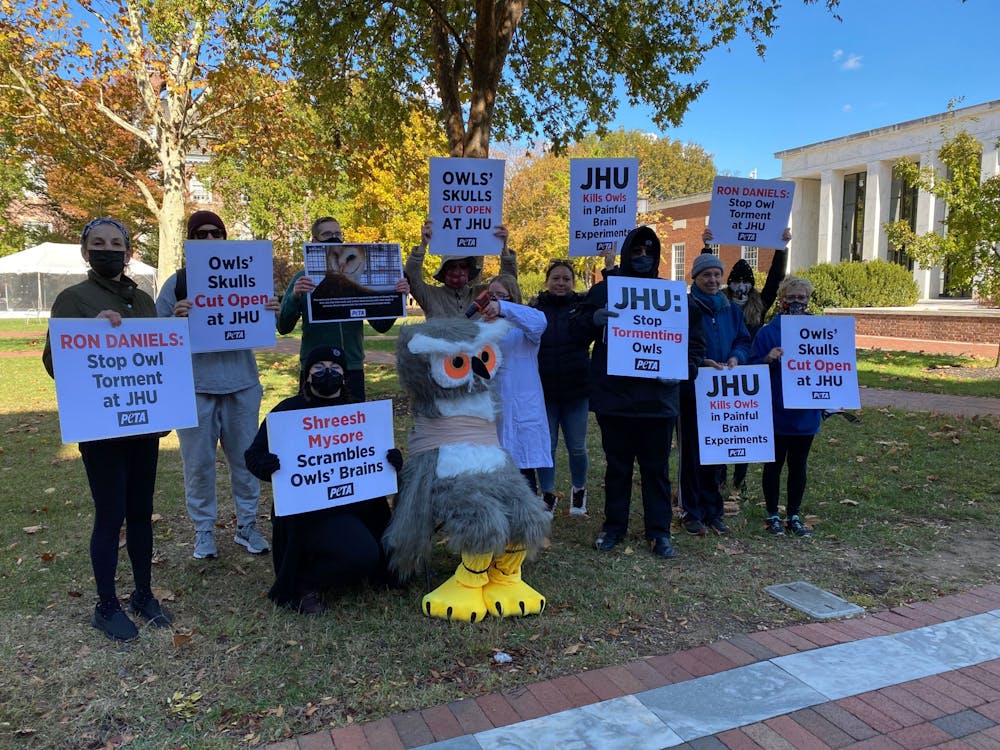Correction: The headline for this article incorrectly states that PETA has staged four protests. A previous version of this article also included the same error. The News-Letter regrets this error.
Protesters representing People for the Ethical Treatment of Animals (PETA) gathered on Keyser Quad Nov. 3, the same day that PETA sent letters to state and federal officials in opposition of Shreesh Mysore’s barn owl experiments. This protest marks the thirteenth protest PETA has held at Hopkins, following protests at Commencement in 2020 and 2021 and during Orientation Week this year.
Mysore, an assistant professor affiliated with the Department of Neuroscience and the Department of Psychological & Brain Sciences, performs procedures on barn owls to study human spatial selection and selective spatial attention.
More than a dozen protesters appeared on campus. Two protesters were dressed in costume as a scientist and a barn owl. The protester dressed as a barn owl was restrained in a chair while the costumed scientist held a drill above their head.
PETA also sent letters to the Maryland Department of Natural Resources (DNR) to bar Mysore from obtaining future permits and the National Institutes of Health (NIH) Office of Laboratory Animal Welfare to stop enabling animal experimenters in breaking the law without consequences.
Amanda Brody, a senior campaigner with PETA, petitioned the University to end funding to Mysore’s lab immediately in an interview with The News-Letter.
“We want to penalize [the Mysore lab] to the fullest extent possible for not having the proper permits — and to make sure that he's not granted any permits in the future because these experiments are irrelevant to human health,” Brody said. “We’re going to keep coming back to campus until we see progress.”
Brody also commented on alternatives to animal research that could replace invasive experimentation.
“We want Johns Hopkins and the NIH to redirect this funding to already existing non-animal testing methods like noninvasive functional MRIs that can be performed on consenting subjects,” she said.
These letters follow years of criticism from PETA. In April, the organization filed a lawsuit against the U.S. Department of Agriculture arguing that Mysore’s experiments are unconstitutional. In February and May, PETA sent letters sent to the NIH and DNR, respectively, claiming that Mysore conducted his experiments without a proper permit despite the NIH’s requirement that grant recipients comply with state laws. Most recently, PETA filed a brief of over 13,000 words in the U.S. District Court in August in response to the federal government’s motion to dismiss the group’s lawsuit.
Currently, a petition on PETA’s website calling for the University to shut down Mysore’s project, titled “Multisensory competition and spatial selection: Neural circuit and computational mechanisms,” has over 400,000 signatures.
PETA Vice President Shalin Gala discussed the letters and the motivation for the protest in an email to The News-Letter.
“PETA is urging the National Institutes of Health to stop funding Mysore’s wasteful owl experiments to the tune of more than $1.9 million taxpayer dollars,” Gala wrote. “We are also urging the Maryland Department of Natural Resources to penalize Mysore to the fullest extent permissible for failing to obtain the required permits to possess the owls from 2015-2018.”
In an email to The News-Letter, Jill Rosen, director of media relations for the University, commented on the importance of the experiments and safeguards to prevent animal abuse.
“Dr. Mysore’s research has already yielded new and critical insights that can potentially inform our understanding of deficits found in a number of medical conditions afflicting tens of millions of humans, including ADHD, autism, schizophrenia and Parkinson’s,” Rosen wrote. “Full-time specialist veterinarians provide 24/7 care to our animals who are properly housed in environments that meet and exceed rigorous standards.”
Sunil Kumar, provost and senior vice president for academic affairs, along with Denis Wirtz, vice provost for research, released a statement earlier this year that asserted no illegal action has taken place.
“Contrary to PETA’s assertion that the owls lack protection under federal regulations, research involving these and other birds used for research is subject to thorough, long-standing safeguards under the Public Health Service Policy on Humane Care and Use of Laboratory Animals,” they wrote.
Kumar and Wirtz also accused PETA of harassing Hopkins along with other institutions.
“Despite these extensive safeguards, PETA has engaged in a campaign of intimidation and harassment targeting those engaging in animal-based research at Johns Hopkins and other universities,” they wrote.
Mysore has yet to respond to allegations of ethics and permit violations.





